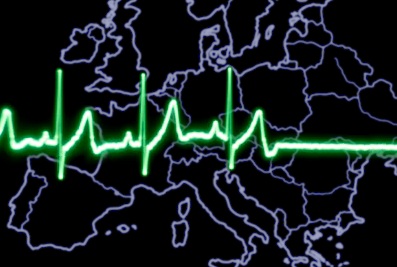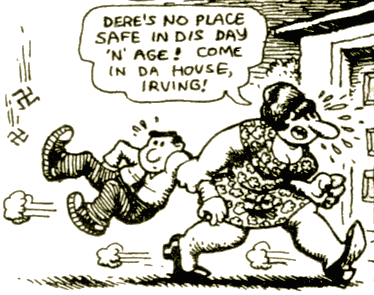
Below are a week’s worth of entertaining news about the latest antics of the European Union as it attempts to micro-manage the affairs of its citizens in the most corrupt and incompetent ways imaginable.
Many thanks to JLH for translating this report from Die Preußische Allgemeine Zeitung:
It Stinks and Crumbles
The Week in Review with Hans Heckel
November 8, 2013(How the EU follows us even into the toilet, what Washington and Brussels think, and how we will identify who is evil)
Crapping Out
It’s just impossible to keep up. First we had to stomach the EU vacuum cleaner ordinance.* And now the Eurocrats are following us into the bathroom. Say hello to the European toilet flushing ordinance! After a year of scientific effort, the EU experts have calculated how much flush water is needed to dispose of what we leave behind.
After countless meetings and practice tests, they concluded that 5 liters is enough. EU standardized toilets should not require more per use. However, just so they do not seem petty, the experts are willing to set an upper limit of 6 liters. Now that is something!
But what will the EU do, if unintelligent defecators sneakily circumvent the guidelines and flush twice? There is still a worthwhile investigative task here for the Brussels latrine committee.
Don’t laugh! They are not doing this for their own amusement, but to save the planet. Since it is dry in southern Spain, it is unconscionable that people in sopping wet Hamburg should waste any more water. To be sure, not one drop of the water available in Hamburg will get to Spain. But seen purely statistically, the situation would improve. And that is what interests us.
Side-effects are of no interest to the experts in Brussels. Side-effects like the following. Population is shrinking in many German rural communities, so increasingly less water is being drawn from a water supply network that has remained constant, and the pipes are strained by that. Waterworks are already being forced to pump water through the pipes, simply to prevent decay. Water that never runs out of a tap or down a toilet. Brussels’ little trick will just make this worse.
It does not occur to the Eurocrats in Brussels that the same water conservation regulations for the Iberian semi-desert and the sopping wet regions of north Europe is nonsense. What we want, surely, is the most “similar” possible living conditions all across Europe. And for that we must have the same rules for everyone. Well, at least nature in Spain will be indebted to the EU… or not? The question is, is it really the toilets that use so much water? Or perhaps, the gigantic, artificially watered fields, created with juicy EU financial grants. Or hundreds of golf courses that owe their existence to EU incentives and must be watered every night so that the Andalusian sun does not turn them into steppes?
No, it’s the john! First, because visitors to the bathroom have no lobby, like the golf course developers or agribusiness and, second, because…well, it doesn’t matter. We will bravely bear this restriction too, even if the consequences stink to high heaven.
It’s Not the River Kwai
Europe doesn’t come cheap, but then, it does great things. For over a hundred years, the residents of the village Widin in the northwest tip of Bulgaria have dreamed of a bridge over the Danube connecting them with Rumanian Calafat.
Nothing happened until the EU came. Last June, EU Commissioner Johannes Hahn celebrated the opening of the three-and-a-half-kilometer engineering marvel. It was a true example of European cooperation: built by a Spanish construction firm with Spanish, Portuguese, Polish and a few Bulgarian construction workers and made possible by an EU grant of €106 million — mostly from Germany, as usual. So Hahn symbolically christened it “New Europe.” Applause.
Who “New Europe” connects to whom was lost in the euphoria. People are leaving this area in droves. So, soon hardly anyone will need the bridge.
But that is just as well. Just four months after the dedication, “New Europe” is falling apart. The Spanish firm was so sloppy that even the Balkan authorities are indignant. So the Spanish firm will have to pay damages, right?
Unfortunately, no. There was no guarantee in the contract. The construction firm just had to make sure while they were bumbling that their underhanded maneuvers did not come to light before the transfer of ownership. After that? Up yours! Of course it would be presumptuous and downright Europe-hostile to assume any kind of corruption here. But it is touching to learn that EU and local authorities have worked so closely with the construction firm that the firm could disappear without a shred of responsibility.
The Mouse That Squeaked
Above all, we should not let snafus like this confound our belief in the EU. Who would we be in the world if Europe did not speak with one voice? Faced with great powers like the USA, only the EU as a whole
can have an effect.
In a harsh reaction to the NSA spying affair, the EU parliament sent a “high-ranking delegation” overseas to really pound on the table at the Amis. Did our “high-rankers” meet the president? No. His representative? No again. The foreign minister? Nope. Well, then, who the devil met them? During their three-day stay, according to media reports, they were allowed one conversation with NSA chief, Keith Alexander. He told them that German citizens and Chancellor Merkel had been listened in on. We had known that for weeks from the newspapers. But now the EU representatives had found that out too. Alexander did not wish to say any more to the MEPs, who are said to have spent the rest of their three days meeting with US congressmen and -women, who seem to have been so low in the hierarchy that even experienced Washington correspondents did not know their names. So the EU really made an impression in Washington. Even delegations from Swaziland or Micronesia would have been better received than the “high-rankers” from Brussels.
Furthermore, the leader of the Brussels delegation was an MEP from Great Britain — which works hand-in-hand with the USA in their spying.

Svastikles Falling From Outen Da Sky
Rightist populists and rightist radicals greedily snap up things like the potty regulations, the bridge or the Washington visit as fodder for propaganda. When they are not busy harassing foreigners. With mounting discomfort, politicians and media perceive that citizens are more and more uncomfortable with the exasperations caused by economic immigrants. Horrified, the “Spiegel” reports on a citizens’ demonstration against a home for asylum seekers in Saxon Schneeberg, into which the NPD is said to have inserted itself. To illustrate what kind of people these Schneebergers are, the paper reveals that “Schneeberg is only 15 kilometers from Zwickau, the bolthole of the right-terrorist NSU.”
Aha, geographic proximity alone makes the people suspicious. A suborning logic. Now if the “Spiegel” should want to unmask the darker soul of our Polish neighbors, it will probably go like this: “Poland is only 50 kilometers from Berlin, where Adolf Hitler ruled.” It is immediately clear to all the readers of the magazine — These Poles must be really bad people.

* Restricting the amount of energy a vacuum cleaner may use.

Brilliant. Thanks for the laugh, even if tragic.
Pingback: Flatline Europe | The Daily Squawk
Pop!! Goes the weasal………..
Well, the press in my country (Romaniaș as a side note, the people are properly called Romanians, not Rumanians) wrote that the majority of the damages are on the Romanian side of the bridge. Here the press is eager to pounce on the corruption of different authorities, from local level to central government. Well, eager when is not in the pocket of sponsors of the men in power, that is (most press is not impartial, being owned by businessmen with political interests and connections).
Very entertaining (and depressing). Regarding wasteful use of resources, however: as a British subject- sorry, I mean citizen- of the EU, I don’t share the view of many of my fellow “Libtards” (and some on the Right) that global warming is caused by human activity; natural cycles of the Sun seem a more likely explanation (though acidification of the seas, and their pollution with plastics, is definitely down to us).
But reducing unnecessary consumption of resources, and pressure on the infrastructure that supplies them, is sensible, and not only to cut consumers’ bills: it is ridiculous to use scarce water, say, to irrigate rice crops in California when SE Asia has paddy fields supplied by nature.
Future generations may develop methods of propulsion which don’t need fossil fuels, but what will they use for lubricants and petrochemicals if we’ve extracted all the gas and oil, including fracking and arctic drilling? I’ve recently had the great privilege of travelling around Europe by electric trains (you get a better view than from the air), but would have difficulty doing the same in North America, yet I hear that something as basic and obvious as a high-speed rail link from LA to San Francisco is delayed. The EU tried to impose a duty on aviation fuel a few years ago- much to the annoyance of the Chinese- when they should have concentrated on short-haul flights, which are unnecessary here and should be generally.
Some years ago I wrote to the UK cosmetics retailer Body Shop, which prides itself on being a “good citizen”, asking why they keep their doors open, wasting energy heating or air-conditioning the street; they said their franchisees faced competition from the likes of Boots (a major drugstore/pharmacy chain in the UK) who leave their doors open. So I wrote (several times) to the UK Department of the Environment suggesting legislation was needed, and got bland and dismissive replies. It’s got worse since: now banks here, as well as retailers, habitually waste energy (largely derived from fossil fuels) by propping their doors open. Even if resources were infinite, this must increase their bills and therefore the prices they charge the public.
I forget who said that a fanatic is someone who, having forgotten his aim, redoubles his efforts, but this perfectly characterises the Eurocrats’ concentration on side-issues: which maybe brings us round to the PC MC brigade, whose original aims (fighting irrational prejudice) were laudable (IMHO), but they didn’t know when to stop. I’d like to think we could agree on this, but I’m not holding my breath…
Mark H: no offense, but we sure as heck do not need more gov’t regulations, more nannies, or gov’t ‘help’ in the budiness sector, etc. You are very much dead on with the global warming and pollution. As far as any high speed rail in the USA, they always cost way too much, are hugely underused and never built in any reasonable time frame. The net effect is a massive waste of dollars, energy, natural resources, etc.
My post was already too long, and maybe discursive, or I would have added that the tax system would have to be restructured over time to incentivise travellers to use trains rather than ‘planes or cars, but many here would likely consider this too “socialist”!
The European governments who subsidise the building of high-speed rail networks don’t expect to get their money back directly, but through the boost to the economy.
I’m longing for the ancient times of free markets and economic reasoning…